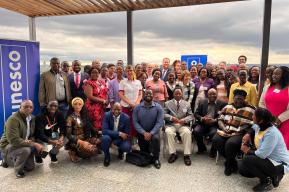News
UIL and Moodle present success factors to strengthen digital skills of literacy educators

The UNESCO Institute for Lifelong Learning (UIL) and Moodle presented the results of their collaborative project to improve the digital competencies of literacy educators globally through the Global Alliance for Literacy (GAL), at a webinar in January. Their presentation focused on the key success factors captured by the project.
In 2022, Moodle collaborated with UIL in converting the Institute’s core training content and materials into an online course for literacy educators, while ensuring that the diverse technological infrastructure and learners needs in GAL countries were addressed. The online course was rolled out in Bangladesh, Cote d’Ivoire, Egypt and Nigeria, supporting improvements in the skills of thousands of literacy educators.
During the webinar ‘Designing for mobile and offline environments’, UIL co-presented the experience of the collaboration, also reflected in a recently published case study. The webinar was an opportunity to share knowledge and take suggestions from the wider Moodle community about the design process through which GAL countries can meet the challenges faced by users, including low and unreliable internet connectivity, the use of a wide range of basic digital devices, and the limited familiarity with online learning among some users. These contributions will benefit the roll-out of the training in more countries in 2023.
The cooperation with Moodle is part of the UNESCO-led Global Education Coalition.
Background
Since its launch in 2016, the Global Alliance for Literacy within the Framework of Lifelong Learning has driven international discourse and guided the agenda for literacy provision globally for those who need it most. The alliance includes 30 countries committed to improving youth and adult literacy. It serves as a platform for its members to collectively discuss progress and challenges, and exchange knowledge and good practices.








